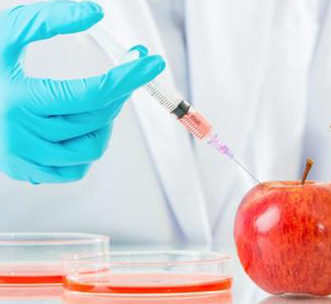

Genetically Modified Organisms (GMOs) are those whose genetic framework has been altered either to remove a deficiency or to introduce a positive trait. Genetic modification of bacteria in 1973 was followed by the development of a Human Insulin-producing bacteria in 1982. This became the first Consumer GMO product to be approved by the FDA for use. GM-Tomato, the first Plant GMO was approved in 1994.
Foods / Feeds manufactured with / or containing GMO ingredients are considered to be Genetically Modified (GM) Foods & Feeds. Pest and Herbicide-resistant GM Crops are now cultivated or imported in over 70 countries around the world. GM Crops may enter non-GM Food and Feed production unintentionally. GMOs are a matter of debate with critics arguing that risks far outweigh the purported benefits and extensive studies are required to assure their Safety as Food & Feed. GM Cotton is the only GM Crop to be introduced in India.
USEPA, USFDA-DHHS, & USDA-APHIS are three Agencies responsible for the Regulation of GM Crops in the USA. EPA regulates Bio-pesticides, including Bt. Toxins, under the Federal Insecticide, Fungicide, and Rodenticide Act (FIFRA).
FDA Regulates the Safety of GM crops under the Federal Food, Drug, and Cosmetic Act (FFDCA). GM crops cultivated for use as Human Food or Animal Feed are designated “Generally Recognized as Safe” (GRAS) only if they are “substantially equivalent” to non-GM ones and do not require pre-market approval. Pre-market approval is mandatory for Non-GRAS GM Crops. The FDA Center for Veterinary Medicine ensures the safety of GMO and non-GMO food for animals.
The EU provisions (Regulations (EC) No 1829/2003 & 1830/2003) relate to “Authorization Procedures & Supervision” aim at facilitating Consumers and others i.e. Farmers, Food / Feed Chain Operators etc. to make informed choices by ensuring the traceability of GMOs in the Market and clarity in Labelling.
In India, all GMOs & their product-related activities are governed by “Rules for the Manufacture/ Use/ Import/ Export and Storage of Hazardous Microorganisms, Genetically Engineered Organisms or Cells, 1989” under the provisions of the Environment (Protection) Act, 1986 through the Ministry of Environment and Forests (MoEF).
DNA-based and Protein-based Methods are considered to be the most effective in detecting GMOs. DNA-based GMO Testing involves Genome Analysis to identify the presence of genetic modification. Protein-based GMO detection is done through an Enzyme-Linked Immunosorbent Assay (ELISA).
EFRAC undertakes the identification & quantitation of GMOs across various Food matrices in compliance with the Regulatory requirements.

GMO
• Amino acids • Fatty acid composition • Vitamins • Minerals • Metals • Secondary metabolites • Phytosterols • Carotenoids
• PCR /RT-PCR • ELISA & Lateral Flow Device/ Dipstick
• Proximate Analysis • Immunologic • Genetic